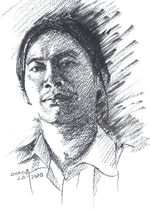The positive changes in Burma have taken many political pundits and observers by surprise. After decades of nothing but grim news, some say that the country is finally undergoing a remarkable transformation. But not everyone is convinced.
To skeptics, the current government is nothing more than an offshoot of the previous regime. After all, it was Snr-Gen Than Shwe, the leader of the former junta, who fixed the outcome of the election in the November 2010, and who handpicked retired general Thein Sein to serve as the current president. Nearly two years after assuming that role, Thein Sein still finds finds himself surrounded by Than Shwe loyalists, both in Parliament and in his own cabinet.
The only difference between this regime and its predecessor, say the skeptics, is that Thein Sein is using soft power to win the hearts and minds of the Burmese people and the international community, whereas Than Shwe didn’t seem to care what anyone thought of his brutal rule.
Thein Sein, who spent several years as military-ruled Burma’s mild-mannered prime minister before taking on his new role as the country’s chief executive, is something of an enigma. A graduate of the Defense Services Academy, an elite military college, his views on Burma and world affairs have been shaped by his life-long commitment to the armed forces. He seems an unlikely democratic reformer.
Last week, as if to confirm where his true loyalties lie, he appointed two more former generals to his cabinet, picking the country’s air force commander to head the Ministry of Communications and Information Technology, while a senior army officer will take over the Border Affairs Ministry. (Border affairs, along with the home affairs and defense, fall under the military’s purview, according to the 2008 Constitution.)

“As the new telecoms minister, Air Force Commander-in-Chief Gen Myat Hein replaces Thein Htun, who was forced to resign last month after an anti-corruption probe at his ministry implicated him and eight other ministry officials,” The Irrawaddy reported last week.
Myat Hein, 58, joined Burma’s armed forces in 1976 and became air force chief of staff in 2001, before Than Shwe promoted him to air force commander-in-chief in 2003.
The new minister for border affairs, Lt-Gen Thet Naing Win, is also a career military man. He comes to his new job from the army’s Bureau of Special Operations, which he joined after serving as the commander of the Southeastern Regional Command in the 2000s.
The practice of appointing active and retired military generals to serve in the government is nothing new. For decades, Burma’s military rulers assigned generals to fill posts they were totally unfit for. So for Thein Sein to repeat this pattern is definitely not a positive sign.
Those who want to defend the president say, however, that he has taken some real risks since coming to power. He and handful of reformist cabinet ministers have repeatedly pushed the envelope to open up the political space in Burma, they say.
It’s true that he has released several hundred political prisoners, lifted censorship and tolerated civil society groups. This has earned him some real respect, not least among some of the staunchest critics of the former regime. Even a number of former exiled dissidents educated abroad have returned to work for him.
Then there’s his success in winning the trust of ethnic armed groups, including the Karen, Mon, Shan and Chin. Recently, he invited Karen National Union leaders to the capital, where there was a great show of amity all round. Not much of substance came out of the visit, but in some quarters it raised hopes of the “permanent peace” that Thein Sein spoke of in his Union Day speech last week.
But none of this erases the fact that a bloody war rages on in Kachin State (although less intensely than it did a month or so ago, when Burmese fighter jets were still bombarding positions near the Kachin Independence Organization’s stronghold of Laiza), and that last November, local security forces launched their most brutal assault on peaceful anti-mine protesters since the crackdown on the Saffron Revolution in September 2007.
The other big shadow hanging over all the talk of reform in Burma is the 2008 Constitution. Thein Sein once oversaw the drafting of this cornerstone of military dominance, which grants the armed forces 25 percent of the seats in every legislative assembly and says that the military must play a future role in national politics.
If Burma is to move forward with genuine reform, constitutional reform is absolutely essential. But does Thein Sein have the political will to change to the Constitution?
It seems unlikely that the president, who has a history of heart problems, has the energy to push forward with reforms, which are facing growing resistance from some hardliners and leaders in the ruling Union Solidarity and Development Party (USDP). His rivals are increasingly assuming powerful positions in the government, and are ready to pounce on him for being “too accommodating” in his dealings with Aung San Suu Kyi and ethnic groups, as one USDP leader put it.
Soe Thein, a senior minister in the government, once told me that the government has been earnest in its efforts to to open the country up politically. He didn’t seem too concerned about the backlash, since, as he said, “We are bound to be criticized anyway.” It was simply the price of doing what no one else dared to do.
But others in the government seem less sanguine. “The more risks we take to push reforms, the more enemies we make,” said one senior official.
















